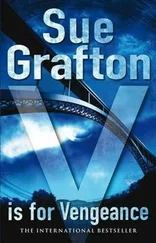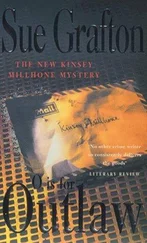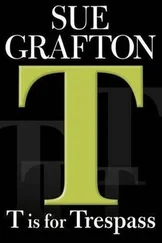"Did you see the driver of the truck?"
"Not really. It was some young girl, but I didn't get a clear look at her face."
"What about the license number? Did you catch that?"
He shrugged apologetically. "I never even thought to look. The truck was white. I know that."
"You remember the make?"
"Ford or Chevy, I'd guess. American, at any rate."
"How'd you find out who David Barney was? Did he introduce himself?"
"Not at the time. He got in touch with us later."
"How'd he know who you were?"
"He tracked us down through the department. Me and my buddy James. He knew the date, time, and location so it wasn't that tough."
"Can James confirm this?"
"Sure. We both talked to the guy."
"At the time Mr. Barney got in touch with you, did you know about his wife's murder?"
"I'd been reading about it in the paper. I didn't realize the connection until he told us who he was. Jesus, that was nasty. Did you hear about that?"
"That's why I'm here. The guy still swears he didn't do it."
"Well, I don't see how he could. He was miles away."
"You remember the time?"
"About one forty-five. Might have been a little earlier, but I know it wasn't later because I looked at my watch just as he was taking off."
"Didn't it seem odd to see someone out jogging at one-thirty in the morning?"
"Not a bit. I'd seen him jog along the same path the night before. Emergency work you see all kinds of things."
"You testified at the murder trial, didn't you?"
"Sure."
"What about this round? Will you testify again?"
"Absolutely. Glad to do it. The poor guy needs a break."
I thought back through Barney's story, trying to remember what he'd told me. "What about the cops? Did the police ever interview you?"
"Some homicide detective called and I told him everything I knew. He thanked me and that's the last I ever heard from him. I tell you one thing-they didn't like him. They had him tried and convicted before they even got him into court."
"Well, thanks. I appreciate this. You've given me a lot of information. I may get back in touch if I have any other questions." I gave him my card in case he thought of anything else. I crossed back to the car and sat there, making notes while his comments were still fresh.
I thought about Tippy, searching my memory. Rhe had told me those were Tippy's teen alcoholic years. If I remembered right, Rhe had sent her off to live with her father because she and Tippy had had a falling-out. So how would Rhe know if she was in that night or not? Maybe I should just ask Tippy and be done with it. "Do the obvious" had always been a working motto of mine.
I glanced at my watch. It was 5:35. Santa Teresa Shellfish was out on the wharf-maybe two blocks from my apartment, which was not that far away. I headed for home, across the backside of Capillo Hill. If Tippy was out that night, I couldn't see why she wouldn't own up to it six years later. Maybe nobody'd ever asked her. What a happy thought.
I parked the car in front of my place, dropped off the briefcase, plucked my windbreaker off the back of the door, and walked the two blocks to the wharf. The sun wasn't quite down yet, but the light was gray. The days were" marked by this protracted twilight, darker shadows gathering among the trees while the sky remained the color of polished aluminum. When the sun finally set, the clouds would turn purple and blue and the last rays of sun would pierce the gloom with shafts of red. Winter nights in California were usually in the fifties. Summer nights were often in the fifties, too, which offered the possibility of sleeping year-round beneath a quilt.
To my right, a quarter mile away, the long slender arm of the breakwater curved around the marina, cradling sailboats in its embrace. The ocean pounded on the seawall, the force of the waves creating a plume of spray that marched from right to left. Beneath my feet, the pier seemed to shift as if nudged by the waves. The smell of creosote rose like a vapor from heavy timbers saturated to a dark gloss. The tide was high, the water looking like dark blue ink, silver pilings stained with the damp. Cars rolled down the pier, the rumble of loose boards creating a continuous tremor along the length. The fog was rolling in, bringing with it the damp cloudy smell of seaweed. Darkened boats were moored just offshore in the poor man's marina.
On the wharf itself the lights were bright and cold against the deep shadows of the ocean. The Marina Restaurant was ablaze, the air around it scented with the savory aroma of char-grilled fish and steaks. One of the parking valets jogged toward the end of the small lot to retrieve a vehicle. Gulls rested on the peaked roof of the bait-and-tackle shop, the shingled slopes banked with snowy white where the bird droppings had collected. The fishermen were packing up, tackle boxes clattering, while a pelican waddled about beady-eyed, still hoping for a handout.
Looking back toward the town, I could see the dark hills carpeted in pinlights. The 101 was laid out parallel to the beach, the California coastline running an unexpected east to west in this stretch. Across the four lanes of the freeway, the one- and two-story buildings in the business district marched away up State Street, diminishing in size like a drawing lesson in perspective. The palm trees were a dark contrast to the artificial light that was just beginning to bathe the downtown with its pale yellow glow.
The sun had now dropped from sight but the sky wasn't completely dark, more the ashen charcoal gray of a cold hearth. I reached the brown-painted board-and-batten building that housed the Santa Teresa Shellfish Company. Eight wooden picnic tables and benches were secured to the pier out in front. The three employees inside were young, late teens-in Tippy's case, early twenties-wearing blue jeans and dark blue Santa Teresa Shellfish T-shirts, each emblazoned with a crab. Along the front of the booth, seawater tanks were filled with live crabs and lobsters, stacked on one another like sullen marine spiders. A glass-fronted display case was lined with crushed ice, fish steaks and fillets arranged in columns of gray and pink and white. A counter ran along the back. Beyond it, through a doorway, I could see an enormous fish being gutted.
They were in the process of closing up, cleaning off the counters. I watched Tippy for almost a minute before she spotted me. Her motions were brisk, her manner efficient as she waited to take an order from a fellow standing at the display case. "Last order of the day. We gotta close in five minutes."
"Oh, right. I'm sorry. I didn't realize it was so late." He scooted down toward the tank, pointing to the hapless object of his appetite. She tucked her order pad in her pocket and plunged her arm into the murky water. Deftly, she seized the lobster across its back and held it up for his approval. She plunked it on the counter, grabbed up a butcher knife, and inserted the tip just under the shell where the tail connected to the spiny body. I glanced away at that moment, but I could hear the thump as she pounded the knife and neatly severed the creature's spine. What a way to earn a living. All that death for minimum wage. She popped it in the steamer, slammed the door shut, and set the timer. She turned to me without really registering my identity.
"Can I help you?"
"Hi, Tippy. Kinsey Millhone. How are you?"
I saw belated recognition flash in her eyes. "Oh, hi. My mom just called and said you'd be stopping by." She turned her head. "Corey? Can I go now? I'll close out the register tomorrow if you can do it today."
"No problem."
She turned to the fellow waiting for his lobster dinner. "You want something to drink?"
"You have iced tea in a can?"
Читать дальше











